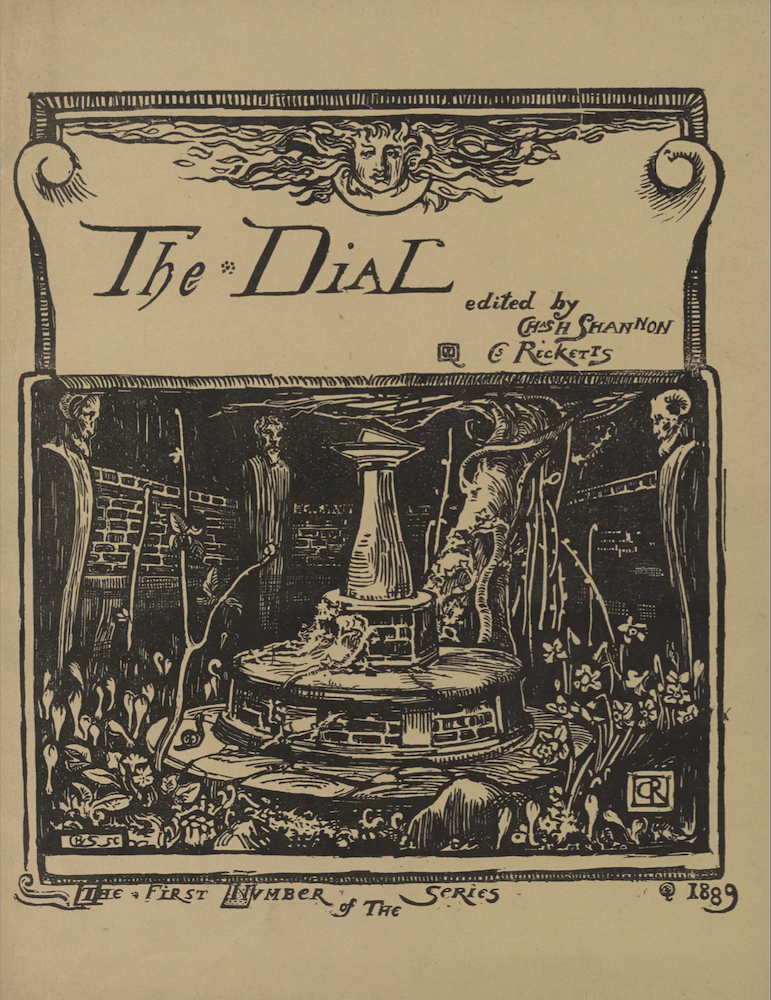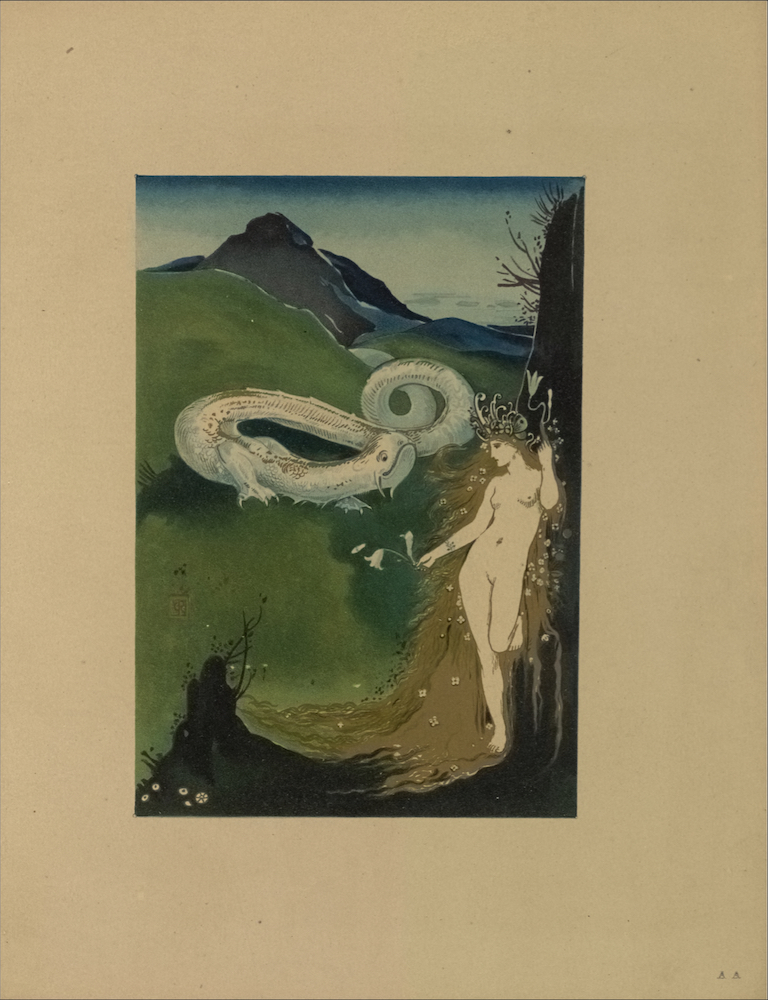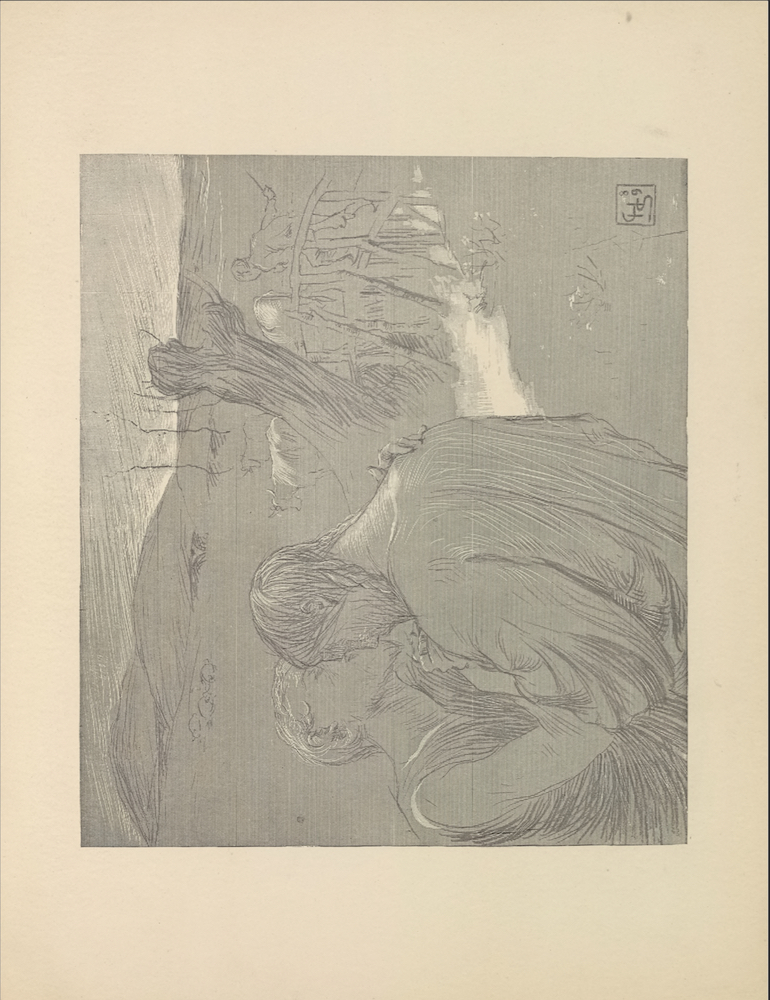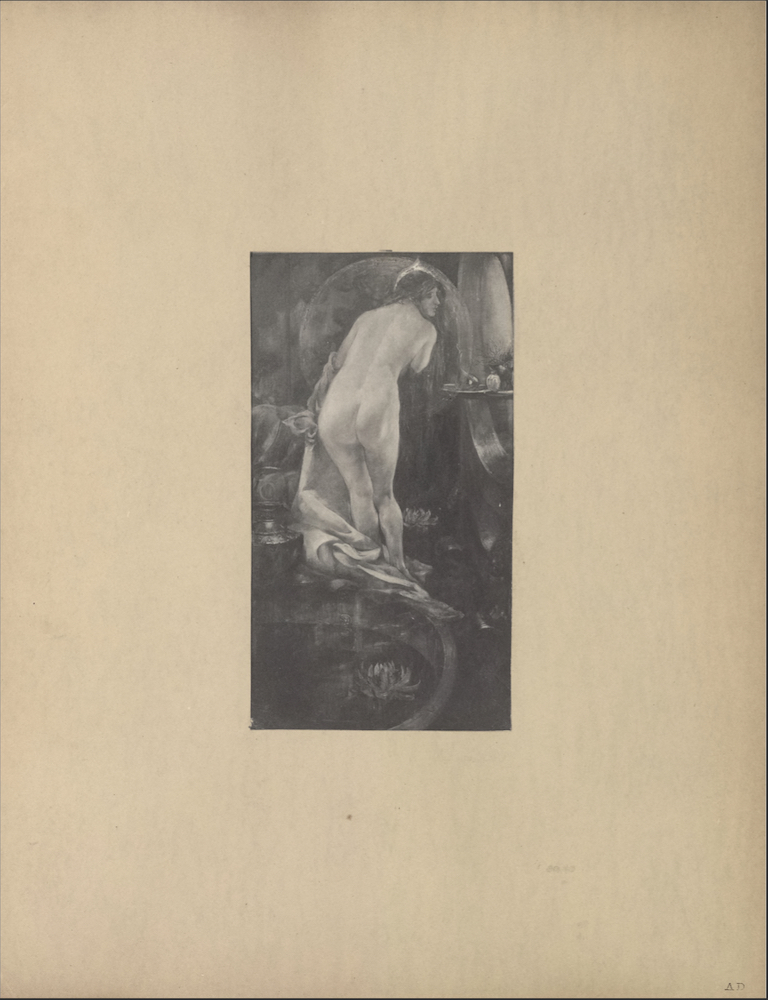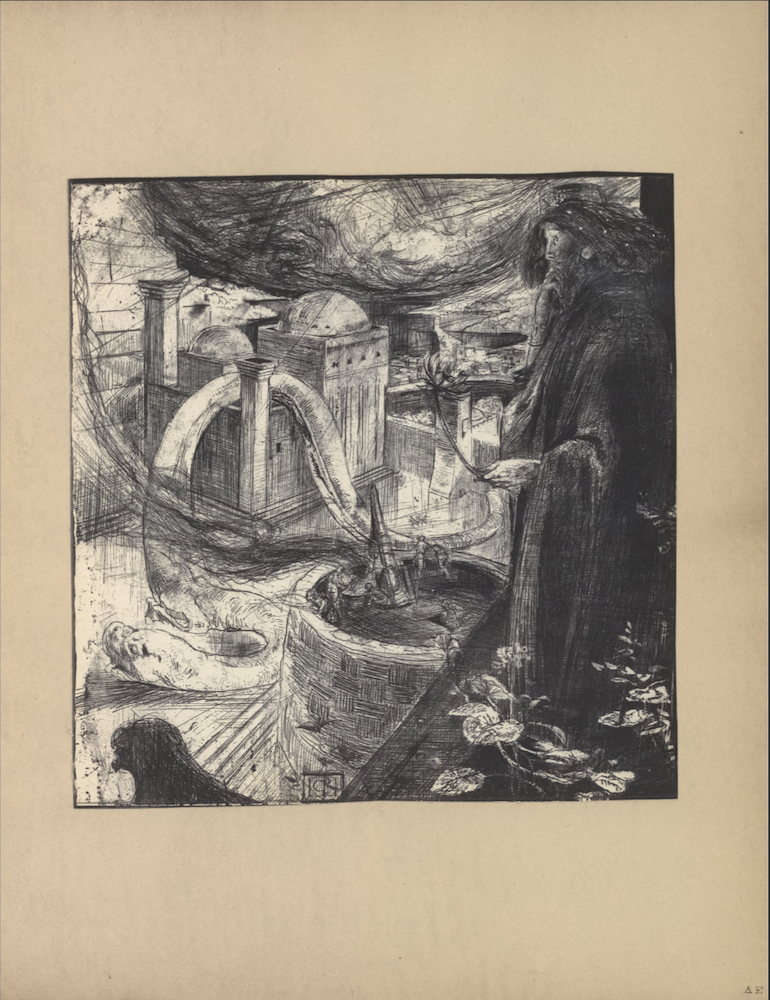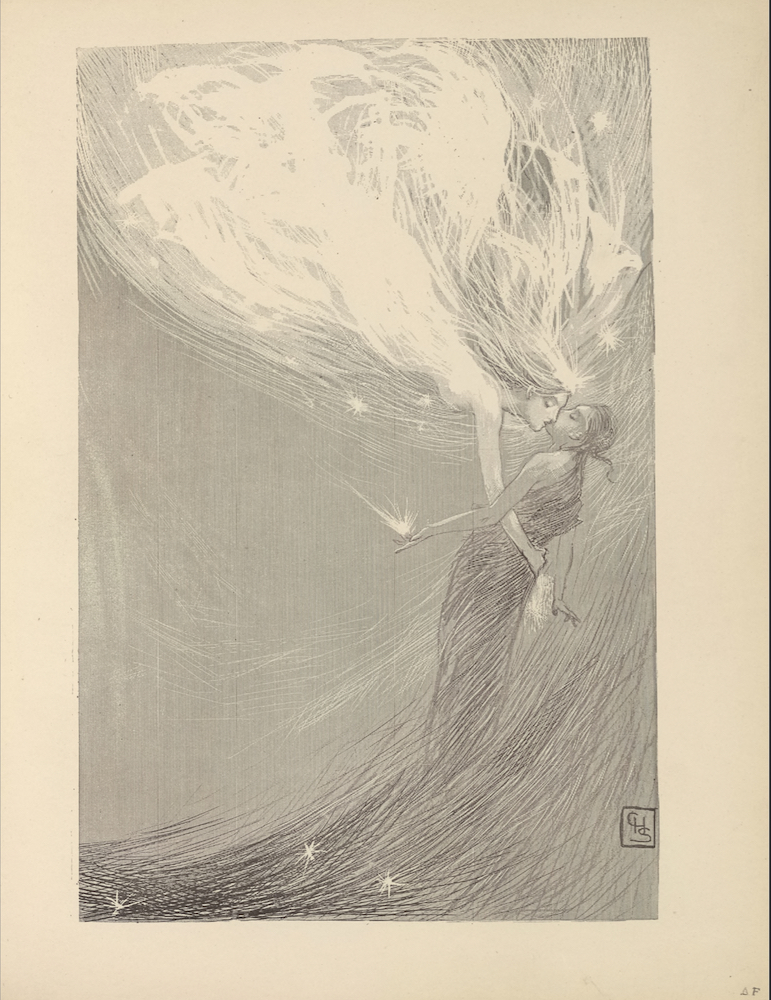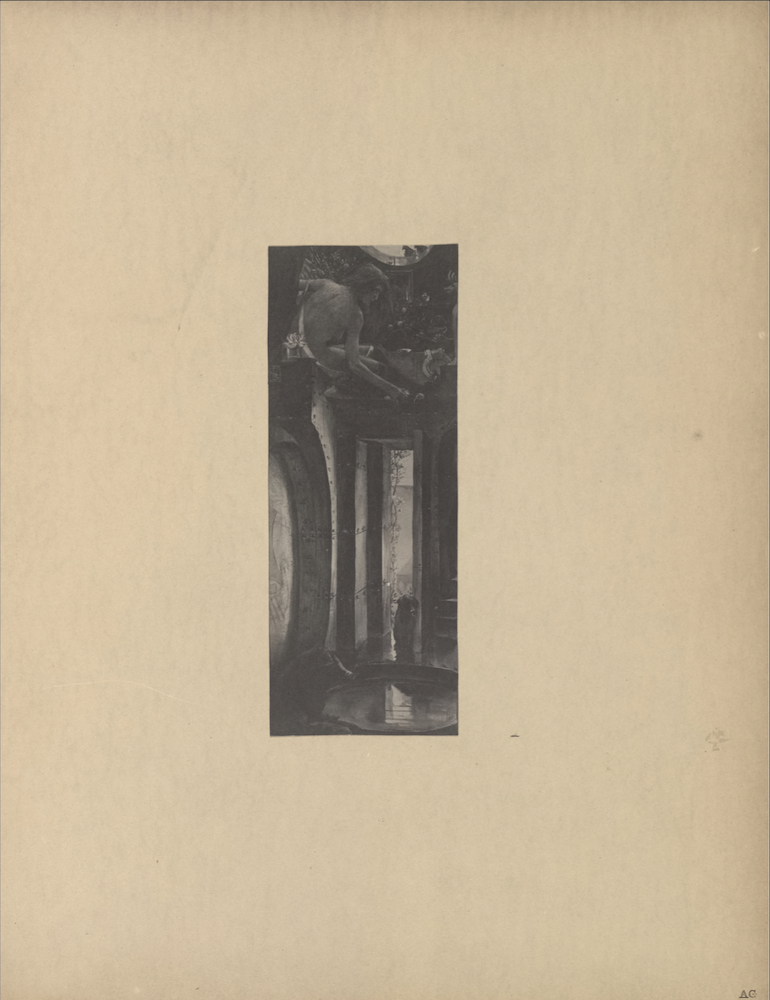
The Database of Ornament
THE sound rolls through the reddening
air, the muffled thum! the dumb! of a
monotonous
drum. Lamps flash ruddily
on gaudy pictures of the promised piece,
The Giant and Maiden. Again ’tis the
chart of the human frame flaming by
lamp-
light, with bright red veins, and liver a
beautiful yellow.
Shouting clowns hoarsely
proclaim the virtues and cures of an elixir,
a magic goblet; or lift the curtain to show
the careworn princess in
her tinsel and
spangles. And drums are rolled.
Come in! Come in!
Tis a trick; a dear old-world trick;
and in my quality of clown, I pray you,
let
me rattle my bells, show my happy cup, or
make each weary puppet
walk before the
crowd, shout, declare the oldness of my
piece; for
it is a play, and not a medicine after all, my Cup
of Happiness; not an
elixir, a cure for the liver; it is a
farce, an old farce; I vouch to its
age, for it was begun by
Madam Thalia, when the world was still young,
still a
delightful green, the beautiful green of a newly-painted
cupboard; but the play lasted too long, and has changed
considerably
since; however, do not hesitate, I vow the
play is old, old as Comedy
herself.
In a bright garden, near a rail, stands a strange statue,
but bitten to
death is La Comédie Humaine, and writhes
behind her stone-white mask.
27
The muse laughed on; so did the mask, grimly, growing heavy,
too heavy. She
danced with mad rapture, laughing shrilly, whilst
her nervous hands,
convulsed, clutched its grinning cheeks; but the mask
of stone laughed the
more at this, growing heavy, heavier still. Then
her agonized hands could
hold it no longer, the mask fell to the ground
and broke its nose.
The muse? she vanished in a frenzied hickup, for all the world like
the
snapping string of a violin.
Since this the white mask has been shown, with its sunken eyes, its
broken
nose, and its hollow awful eternal laugh, with castagnettes rattled
to an
ominous tune, with exaggerated tibias.
Schumann, like many, once saw this mask, this fatal mask, and has
sung of
it, a sob that is sobbed with clenched hands, accompanied by the
throbs of
a beating heart—Warum.
But this song is older than father Schumann’s song; the swelling
waves chant
the older melody, a Warum more minor, but laugh ironically
as they sweep
from the beach, trimmed with rippling bubbles, inviting to
their
liquidness, to the secret of their song, Warum?
How the water splashes and spreads, in grinning circles, if you fling
it a
stone. Is it a laugh? No,—a sob; for though rimmed with golden
sands it is
not a cup of happiness after all; frankly, the water is sad.
You see it can think back for a considerable time, and since the
breaking
of the mask, so many things have changed.
Once the sweet and gracious lady Venus rose from its depths, through
trails
of these bright chiming bubbles, on dancing foam. The worlds
of Gods and
men went mad ; the stars danced, till they fell like drunken
bees—hark!
the trees still groan, and the rivers moan!
Oh beautiful Lady Aphrodite Anadyomene! mercifully wring the
glittering
drops from your flaming mane into my cup, my Cup of
Happiness; and for the
sake of your beauty, I beseech you do not be
dumb, and in plaster, with
your eyes fixed afar on desolate Cnydos.
Ah, if my fancy, with exquisite tints, could quicken your limbs into
supple
life! perhaps—who knows?—you might tell me you are not Venus
after all,
but Eve, a Jewess; and not wring balm from your splendid
tresses.
Friends! you will see all I say is old, an old tune, with orthodox
Princess
and Prince; even an occasional, and quite accidental, virtue in
the story
is drawn as an initial. It was on a certain night when that
virtue lost
her head—but this is not quite true, as the play will show, for
all
virtues are Byzantine, and cannot bend their limbs.
As clown, I have shouted my talents, vaunted my magic goblet;
and if my
young fingers pull too nervously and obviously at my puppet
strings, know
I am only a pleasant amateur, and not a poor devil ; let
my laughingly
rattle my fool’s bells, my symbolical bells, shaped like
happy cups
reversed ; for all plays want bells, or the Warum song would
continue
monotonously throughout, till the veiled god of comedy, like
28
that mythical old man at the theatre door, puts out the lights one by one,
and shrouds most things with dusty covers; for he is deaf to unlimited
Warum songs, deaf even to the song of the crumbling and changing
atoms,—so
away with narrowing symbolism! laugh! and rattle the bells,
not hung on a
hyacinth sash as a prelude to a mystery—there is no-
mystery—I have pulled
up the curtain.
BY WAY OF PROLOGUE.
The name of my prince is formed of the names of all the Cardinal
Virtues,
composed into an euphonic whole. The greatest care, the most
loving pains,
had been lavished on his education; his bon mots were
printed on pink
paper by public subscription, trimmed with lace designed
by the best
artists only—yet he was not happy! though the welfare of
his kingdom could
only be gauged by the literary degradation of his
foreign neighbours, and
public opinion had placed his portrait in the
National Gallery as an old
master—no, he was not happy.
He tossed, in his troubled sleep, on his orthodox and princely
cushions, on
a golden and orthodox couch; he sighed in his painted
chamber, the walls
politely re-echoing his sighs, for they were painted
with virtues each
overcoming a dragon, each holding a hall-marked Cup-
of Happiness in
tapering hands, each daintily curving the little finger in
so doing.
The Cup of Happiness! The Cup of Happiness! groaned the prince
in his
attempts to recall gems of modern poetry; he suffered from
insomnia, as
should all well-bred and crowned heads, on cushions and
couches of gold.
His princely eyes were dizzied with following the allegorical twist of
the
enamelled and painted dragons, mysterious in the moonlit room.
Here
glistened a gem, lighted by a gem, twinkling in the gray light that
trickled down delicate tracings of incrusted silver, to flash in one vivid
spot, where a virtue held an embossed cup beneath her face, wreathed
with
lingering light gliding round a contour. The faces smiled in the
luminous
gloom.
How his temples ached, as he clasped them with dissolving hands
how the
obstinate smile of one virtue haunted his brain! Yea, in his very
orthodox
cushions.
She lingeringly moved her taper fingers round the rim of the cup,
her eyes
fixed on his, weaving circles of exquisite sound, distant, faint,
but full
of passion, like a bar from Lohengrin; round and round
slowly,
caressingly; the web of visible melody floated from the golden
rim. She
poured a gummy liquid, opalescent at her touch; it glowed,
bubbled,
throbbed, and rose passionately towards her; now incandescent
it sweeps
through the prince’s veins, dancing and seething there; it
bubbles round
him, blending his being with its dazzling liquidness. The
prince staggered
to his feet, the cold floor electrified him; he flung away
his heavy
wreath, heavy with a relentless and sickly scent.
29
The moonlight flowed on the veined pavement.
The breath of endless flowers was tossed towards him as from a
censer,
sickening him; sickly was the colour of his royal robes, sickly
the
pavement reflecting the sinuous yellow folds gliding languidly on
the
glassy surface of polished steps.
The moonlight flowed on moon-coloured jade, slept in a dreamy
haze on steps
of jet, in a copper basin it melted among strange dreaming
water-plants
with fat buds.
The Prince feared he loathed all flowers, as he bathed his head with
wetted
hands, then flung himself on a grassy bank.
There swarmed small tribes in worlds of mosses, in worlds of
lichen on tree
trunks; a moth flew by, brave with its symbols painted
on its wings, its
rainbows, its blood-coloured hearts.
The Cup of Happiness! The Cup of Happiness!
The grasses sighed, and rolled, to the night air, full of that passionate
murmur, the pulsing of the sap, the yearning lisp of the whispering leaves
and rustle of heavy petals.
Something tinkled and trilled, ecstatically kissing soft mosses,
and chiming
through pebbles, to swim through lush stalks, where pined
some melancholy
toad, gasping a mournful, monotonous croak that made
the drooping poppies
swoon on their stalks. A flower hung near, shaped
like an amorous mouth, a
flower with lips! He flung his slipper into a
fragrant bush, and the rose
petals fell in a mass, with the swish of a
trailing robe.
The king felt sick, so he left his kingdom.
The orchestra rolls into a despairing wail. The curtain rises
’mid peals of thunder; twisted
trees sway to and fro in agony. In the
foreground, filled with trailing thorns, beneath which
crawl wicked
snakes, croaks a raven. The sun sets lurid in the distance with extended and
poetical rays. Now and again a faint flash of lightning shines
fitfully at a side wing, near a
palm-tree.
PALM-TREE.
Colophium, away! you are singeing my leaves. I was painted by
an
Academician. You must strike that conceited Oak; ’tis your part. I
am a
symbol of virtue.
LIGHTNING.
I flash where I am told, pitiful canvas. Do you not believe in
Providence?
You have made me miss my thunder, which has rolled
twice.
THUNDER (behind).
Silence there! how came you in this scene? Your place is in the
next act.
We are in an imaginative landscape.
Snakes hiss approvingly; carrion birds, flying across the sun,
cry, Away! away! On the
other hand some Oak-trees in the background
blame the levity of the Lightning, for a palm-tree
is a palm-tree,
etc., …. after all. The Lightning flashes again.
30
PALM-TREE.
Ugh! it has singed my paint. The world has turned atheist since
I was
young.
Gnarled roots and brambles writhe and clutch. A bird is caught
by thorny branches to be
devoured by a snake gliding from a rose-bush
on which hangs a spider web with a butterfly wing
earnestly
painted.
Enter MONSTER
who, fortunately for our story, has spent years in getting a
regulation thorn quite thoroughly into
his right paw, that a hero or
saint passing his way might be the means to higher ends; for he felt
himself worthy of higher things, longed to be fed on tipsy-cake, to own a
pastrycook’s shop, and
saw the Cup of Happiness in a mincemeat
bowl.
When? whither? where?
Takes out a pocket-book, eagerly notes this down to write
verses on, and groans aloud.
Trees, Orchestra, Thunder, all groan
lugubriously. The Lightning flashes near Palm-tree;
this excites
universal indignation, and the snakes and thorns shout Away with both of
them!
Away! Away!
LIGHTNING (to Palm-tree).
We are misunderstood. I did not notice how beautifully you are
drawn.
Thorns and snakes are -a great mistake in nature.
PALM-TREE.
Young friend! you are wise for your years; let us form a society to
suppress them—and immodest literature.
MONSTER.
I swirled into Renaissance arabesques unnoticed. The world is
without
decorative instincts.
The limelight falls on the floor, flashes on the Palm-tree (who
feels flattered), and settles
itself on right entrance.
Enter PRINCE.
For three days I have wandered in a too uncongenial atmosphere; all
strength lacks grace—how true!—all grace, of course, lacks strength—
so I
was offered a post on a review. There is an incompleteness about
most
things, if I may be allowed to say so. This spot, however, seems
tuned to
a nobler key, not so grossly realistic as most; I really think my
higher
nature will be touched presently, and my ominously swelling cloak
makes, I
feel, a nobly decorative mass against the setting sun.
Monster introduces himself with frank manliness. The thorn is
extracted to the huge
appreciation of pit and gallery. The situation
is too literary—The Prince and Monster—the
latter rubs his claws
complacently; gives so full and fruity a sound to “Your Highness,” the
honest scenery feels quite jealous; quotes a few well-chosen verses on
Happiness, and remains
in an ecstacy with tearful eyes before a vision
of a mincemeat bowl floating through space to slow
music.
PALM-TREE (sotto voce).
If you don’t flash brightly against me, I’ll break up the partnership.
BUTTERFLY-WING.
All is not gold that glitters.
Enter FANTASY.
Her form, sinuous as a willow, is swathed in some light
exquisite material, and garlanded
with dainty twigs of jessamine, and
nodding columbine; her jewelled and braided hair knots
31
round an opal; above her brow flutters a black butterfly,
circled by her nimbus tinted like a
dissolved topaz; she holds an iris
twined with ivy, and looks at the Prince over her shoulder
whilst she
holds a red carnation to her parted lips.
Ah! sweet my love! sweet Prince, dear wretch! I love thee! The
word lies
softer than soft velvet tinged a deepening violet, not softer than
my
passion. The word is a poor counterfeit, and apes the truth; as a
dark
shadow, crawling from the sun, is image of the truth that gives it
being.
The word is lourd and gross, I would give sound to it, with a
deep cello’s
note, or sigh of some flosh petal falling with scarce audible
sound, on
floor of ivory flooded with living sun.
How many, how many have been my lovers! They kissed my eyes,
and
passionately my neck, for I am, and was, beautiful. But look you
on my
face, my white face, how many have shed heavy tears; their tears
circle my
throat; for gently I gathered these, and they became bright
pearls to
place upon my bosom, my white breasts like to the domes of
some fair
silvered shrine.
At this she bares her bosom, a pale tea-rose nestles there, the
butterfly flutters to her
mouth.
List! the frightened birds have chirped themselves to drowsiness;
the
muffled sound of distant thunder gives but a deepening zest to the
mad
song of that fond silly bird, that lifts its voice to passion’s utter-
ance. Ah! I could love you thus, and trill a sweet linked text, to melt
your senses into rapt delight, till dazed by throbbing notes, that dance
so swiftly, your heart stops faint within you; and lo! the next notes
drown all remembrance of what has passed—in full enjoyment.
PRINCE.
Bright spirit! your name? I do not know you.
FANTASY.
My name, my name? I have many names; men called me after
some fair women. I
was born of flowers in Adam’s brain; the warm
wind gave me breath; this I
remember me; poor Adam damned!—
They called me Lilith. But the blossoms
still remember me, mimic the
soft veinings of my skin, and glow with
hidden passion they had not then
confessed. Then angels fell, because that
I was sweet to look upon, and
brought from sleepy depths quaint coral
wreaths that yet blush red with
the remembrance. (She sighs.) My presence
moved man to lovely song;
it echoes still, and ever will resound; great
cities grew, piled high like
cliffs, fronted in image of my face, painted
pink in reverence for my flesh.
Soft lyres were turned to curvings of my
waist, to tell how I was fed by
doves. But that was not so royal, or so
glad, as Solomon’s idolatry; he
kissed my footsteps and my dress, on
polished floor of crystal that multi-
plied my image. Poor king! Poor
kings! But no! My love, if
death, is life!
She weaves garlands round her wrists; gradually her eyes close;
she makes a vague ges-
ture towards her head.
32
Ah me! list! list! I hear the tread, the growing dread re-echoes
in my
heart. Tread! tread! and dust in dark clouds as a sign. (She
gives a
scream.) The violet sea is stained with crow-black sails, and sets
a
bloody sun. The city is on flames! on flames! and blots with lurid
red the
circling heaven.
She pauses, dreamily looks for a wound near her bosom, but
finds nothing. Slowly she
takes a pearl from her throat and sadly
drops it. The sound makes her start; but laughingly
she loosens her
hair; it falls round her in a golden cloud; she holds her face with both
hands,
and says:
Ah love! I had many, many, lovers, lovers! look at these ame-
thysts and
pomegranate blossoms; these opals that hold fallen and still
passionate
spirits, glowing in cells of milky crystal; faint beryls that
have dreamt
the dreams of the sea at noon ; these sapphires like dying
eyes; listen to
the song of this splendid ruby, how full of glowing mirth
and rich
delight; it calls the damask rose sick and sentimental. All
these, and
much besides, have men found and devised, to my good
pleasure.
She kisses her hand to the Prince, who leans against the
Palm-tree. She beckons to him.
PALM-TREE (severely).
Madam, I am married!
Enter LIGHTNING
with a pair of spectacles he has borrowed from a
satirist.
Madam still possesses her illusions!
FANTASY.
Do you wish to appeal to the gallery? Away, poor fly-blown stage
property;
or I’ll blow you out.
[Exit LIGHTNING.
The whole stage looks shocked, even the limelight
blushes.
PALM-TREE.
When I was young, however ….
But Fantasy escapes from her clothes, and with her hair
streaming behind her like a comet
dances about the stage
naked.
PRINCE and BACK SCENERY.
The play must stop if this goes on!
MONSTER,
though quite a freethinker, is even more shocked than the
Palm-tree.
The Cup of Happiness will be compromised!
He pulls out an article on. But Fantasy, knotting her white
arms behind her head,
dissolves into space, leaving behind her only the
glimmer of her feet.
[Exeunt.
A SEED.
I swell, I grow, I am growing, I shall be a beautiful tree.
A WORM (pulling at it).
Nonsense! a tree? We are worms! worms!
(To be continued.)
C. RICKETTS.
33
